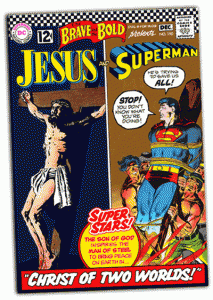 Here’s a fun and quirky Friday musing from my buddy Leighton Connor, a Comicon fanboy and thoughtful Christian who’s part of my writing group in Cincinnati.
Here’s a fun and quirky Friday musing from my buddy Leighton Connor, a Comicon fanboy and thoughtful Christian who’s part of my writing group in Cincinnati.
I especially love the last line: “I like my Jesus like I like my Superman: socially conscious, tough, and super-powered, sure, but still relatable, still someone who suffers the same heartache we all do, simultaneously completely super and completely human.” Sometimes a backstory just gets in the way. –JKR
By Leighton Connor
When I was a teenager in Sunday school, one of my fellow students once asked, “Did Jesus always know he was, like, the son of God?”
The Sunday school teacher immediately responded, “Yes! Jesus is God, and God is all knowing, so of course he always knew, from the moment he was born.”
I instinctively disliked this answer. From a certain theological perspective it may be sound, but from a narrative standpoint, it’s not very appealing. A baby Jesus lying in the manger who can think back to the creation of the universe and look ahead to the whole life ahead of him is not a relatable protagonist. If he already knows everything, what’s the point of being human?
It’s like with Superman. As everyone should know, Jerry Siegel and Joe Shuster created Superman in the 1930s, with the character first seeing publication in 1938’s Action Comics #1. The story in Action opens with a man dressed in blue, wearing a red cape, leaping across the countryside, a bound and gagged woman in his arms. The caption reads, “A tireless figure races thru the night . . seconds count . . delay means forfeit of an innocent life.” There is no explanation of who Superman is or where he’s from.
As the story progresses, criminals try to shoot Superman, and watch in horror as the bullets bounce off. No one knows what to make of this shocking new figure. The governor, in a private meeting with his staff, proclaims, “Thank heaven he’s apparently on the side of law and order!” This is what you want to see—the dramatic first appearance, the shock and wonder when regular people first see what he can do.
Shortly after Action Comics #1 came Superman #1, which explained how Superman was rocketed from the doomed planet Krypton as an infant. Superman’s backstory did not significantly expand, though, until 1945’s More Fun Comics #101, and the first Superboy story.
Superboy comics were about “The Adventures of Superman When He Was a Boy!” According to this new version of history, Clark Kent began fighting crime as a pre-teen in his hometown Smallville. Superboy wore the same costume as Superman, had the same powers, fought many of the same villains, and had the same troubles with his secret identity (only instead of snoopy reporter Lois Lane, Superboy had to hide his identity from snoopy classmate Lana Lang.)
The end result is that, instead of Superman showing up in Metropolis one day and blowing everyone’s mind, Superboy just moved to the city and changed his name. There would be no panic, no meetings in “the governor’s private chamber,” just people saying, “Oh, did you hear he goes by Superman now?” Superman is no longer surprising; he’s just a grown-up Superboy.
Superboy also had friends from the future who told him that he was destined to grow up to be a great hero. And, unlike in the early stories where Superman did not know his own origin story, Superboy always knew he came from the planet Krypton. His super-memory had recorded every detail. He remembered the color of the wallpaper in his nursery, could recall playing on the floor of the lab as his father built the rocket that would carry him to Earth. There were no mysteries in Superboy’s past or future; his whole life was planned out for him from beginning to end, an existentially terrifying fact that he accepted with a bland smile. The once-exciting Superman had become someone you couldn’t possibly relate to.
Mark starts off his gospel with Jesus making a dramatic appearance, getting baptized by John the Baptist, and performing miracles. It’s like Action Comics #1; don’t waste time with exposition, don’t describe your main character’s childhood, just hit the ground running and don’t let up until you reach the end. People always feel the need to add in backstory, though, so it wasn’t long until Matthew and Luke added in infancy narratives, and hints of “The Adventures of Jesus as a Young Boy!”
Which is all fine and good, until you give Jesus super-memory, and time-traveling pals from the future (metaphorically speaking), and next thing you know that whole “My God, My God, why have you forsaken me?” thing is just some empty lip service, words mouthed according to the script instead of any kind of a heartfelt question.
I like my Jesus like I like my Superman: socially conscious, tough, and super-powered, sure, but still relatable, still someone who suffers the same heartache we all do, simultaneously completely super and completely human.

